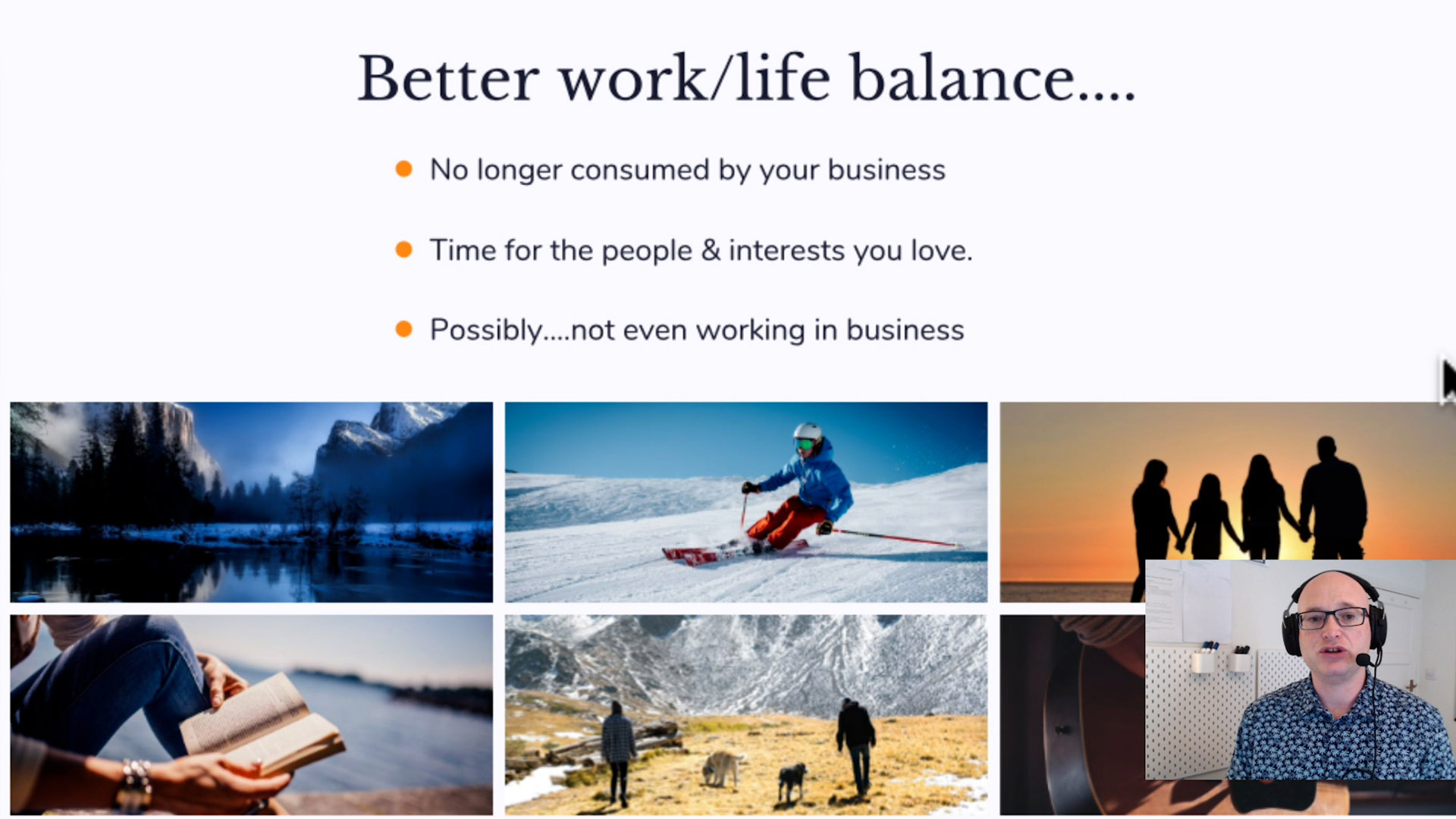As a business leader, you live and breathe complexity.
Managing and balancing complex ideas like…
- Empowering team members VS Making sure tasks get done
- Serving existing clients VS Gaining new clients
- Sharing information with your team VS Ensuring that sensitive data is protected
- The list goes on…
But the point is this: you have a lot on your plate.
With so much to manage, it’s only natural to try and lighten your load by simplifying things.
(Who can blame you!)
To achieve this simplification, leaders tell themselves stories about the people and events they have encountered.

We tell stories like:
– “We didn’t win that pitch because we had typos in our proposal”
– “The project failed because Mandy didn’t pull her weight”
– “The new customer loves us because we answered their emails promptly”
We also use stories to predict will happen in the future:
– “That server room is making a funny noise. I bet a server will fall over soon”
– “Seb will be late again today, I best get in early to cover the phones”
– “My cousin’s firm is absolutely killing it on TikTok, we should be there too”
(Is it okay?… that I wrote TickTock when I first wrote that sentence!)
To create these stories, we take a small amount of data, and use it to extrapolate a narrative that makes sense, a story that our minds can handle.
But here’s the problem, sometime the stories we create are neither true or helpful.
For example…
Jade notices that her colleague Michael never uses a formal tone in their emails to each other. She interprets this as her co-worker not taking their work together seriously.
Jade believes that the lack of formal tone means they are uninterested in the company, and it creates a divide between them at work.
But really, Jade’s co-worker is just very informal with everyone! (Because maybe their culture dictates that it’s rude to use a formal tone with people you know well?)
Jade’s interpretation of the situation has led her down a path that takes her further away from understanding what could be occurring. In this scenario, Jade might start finding more and more evidence for why she believes Michael is uninterested in his job…
This confirmation bias means that Jade is more likely to ignore information, which contradicts her initial assumption.
… and as a result, she might miss out on making friends with someone who could be helpful in the future! This example is simplified, but we all face similar kinds of stories every day – especially because they are so easy to make up when you don’t have all the information.

This above story is an example of confirmation bias : a tendency to look for and favor information that confirms our pre-existing beliefs.
It happens all the time, even when we are not aware of it.
In fact, we humans are excellent storytellers. We use our stories to make sense of the world and to help us predict the future.
But when it comes to leadership, this can be a real problem…
This is because stories are incomplete — they’re biased by the small amount of information we have access to and they lead us toward decisions that don’t always make sense.
They lead us towards the leadership blackhole!

Let’s take another example…
Over the last week, Mahmood has noticed that two of his team members have been slow replying to his emails. Whatsmore, he notices them gossiping at the water cooler, and glancing at him every time he walks past. He weaves a story and concludes…
“They’re probably talking about me,” he thinks. “I bet they don’t like my leadership, and they’re conspiring against me”.
Mahmood sees his team members as adversaries, people who are out to make his life difficult.
However, Mahmood’s imagined story and the truth-of-the-situation could be miles apart. Perhaps both team members are overwhelmed with work and are worried about losing their jobs.
Or maybe one of them is having trouble at home, and their colleague is doing their best to support them through a tricky time.

In this context, the ‘simple stories’ that we tell ourselves can place huge barriers between leaders and their team members.
They can also hurt our futures… our fixation on the first story that we tell, preventing us from examining all the potential options, challenges, and opportunities ahead of us.
For example…
Alan has a server room in his office. Whilst he’s on a conference call with an important client, he hears strange noises coming from the server room.
The noises could happen for many reasons…
- A server is having a non-serious fault
- The air conditioning has a fault
- A pipe is leaking and pouring water on to the floor
- The server is on fire
- Someone’s trapped in the server room
Based on his experiences, Alan might assume that it’s a non-serious fault, and that it’s something he can leave until after the call. But he could be wrong, and he could face a much more serious problem.
Although this is an extreme scenario, it shows how the ‘simple stories’ we tell ourselves can have a tremendous impact on our future decisions and future results.
What to do about these deceptively simple stories?
Well, we can’t stop using stories.
Simple stories are a necessary evil. We need them to understand and make sense of the world. If we don’t use them, we risk being overloaded with data and ideas.
But we can be smarter with our stories. Here’s how…
1. Accept the existence of ‘simple stories’
You must accept that you are are crafting stories about situations and people. You have to accept that the ‘simple stories’ we tell ourselves are not always true, or based on good evidence.
You also need to accept that these imagined stories not only cloud your perception of events past… they can also powerfully influence your future — by closing doors to other opportunities and other possibilities.
For example…
A leader who decides that PPC Ads will never generate leads for their business because of past experiences, shuts off the possibility of ever having a winning advertising campaign.
2. Get more data. Listen to others.
Assume you know less about a situation than you think you do.
Take time to gather more data and listen to others. Listening is an art form, but one that pays huge dividends in business and life.

The key to listening = shut up, put your devices away, stop assuming you know what the other person is saying, be fully open to their point of view, ask questions to deepen your understanding of what they are saying.
3. Start exploring multiple stories
Rather than just accept the first story that comes into your mind about a person or situation, allow yourself the opportunity to develop multiple stories about the situation.
For example, when you’re choosing whether to give an employee a bonus…
What are the multiple stories that could explain why they deserve a bonus?
Do you believe it’s because they hit their sales targets? Their contribution to fellow team members? Their ownership of challenges? Or do you think there’s something more going on behind-the-scenes?
Hopefully, this process of exploring will lead to better decisions and… stronger relationships with your team. 🙂
4. Cast people in different roles
Stereotypes… we all know them and most of us would rather avoid them.
However, when we’re busy, it’s all-too-easy to apply them to the people on our team.
Now, you might be thinking…
“Andrew, I would never use stereotypes”
Well…
That might be true. But our subconscious enjoys placing people in pigeon holes… whether our conscious self likes it or not!
In truth, we are heavily influenced by our first impressions of people.
For example, if someone is late for our first meeting, we might always see that person as a late and tardy person, and our internal confirmation bias may make us work to keep seeing the person that way.
To counteract this, leaders can recast the people who appear in their movie. (To go with this point, imagine your life as a movie).

Rather than seeing people as the villain, or maybe just a surly henchman, try to see people as heroes who are trying to do the right thing in a difficult situation.
(Of course, their goals and mission might be different to yours – but that’s a topic for another time).
Final thoughts
Don’t expect to master the art of internal storytelling overnight.
It will take you a while to get the hang of it, but once you do, you should have a much healthier perspective on the events and people in your business and life.
Better still, the stories-you-tell will become bridges (not barriers) to other people and the best ideas.
You’ve got this.
Have courage, own your future, and take action.
Andrew.












